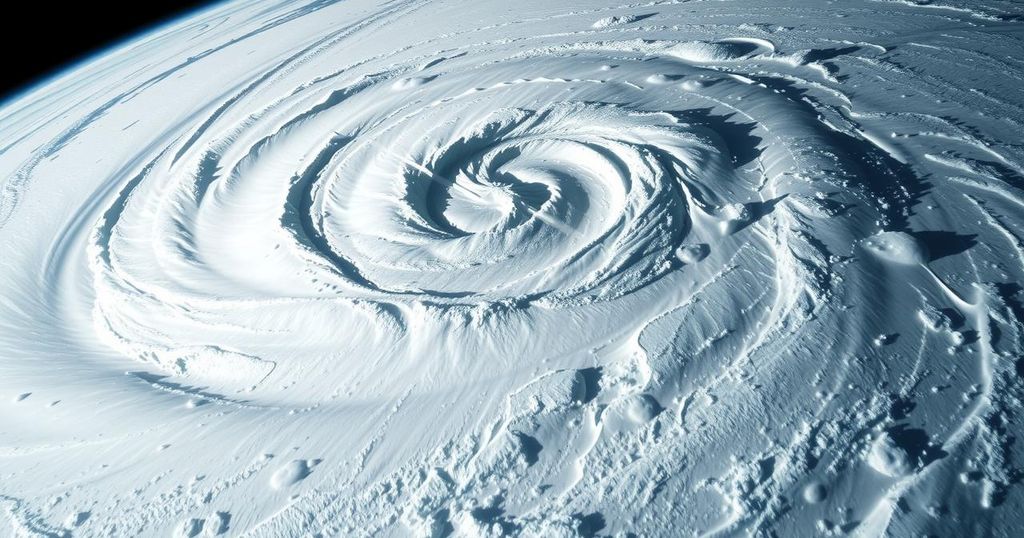World news
AFRICA, AGALEGA, BRUNO RETAILLEAU, CHI, CLIMATE, CRISIS UNIT, EMMANUEL MACRON, EUROPE, EVACUATIONS, FRANCE, INTERIOR, INTERMINISTER, JOINT TYPHOON WARNING CENTER, MAURITIAN, MAYOTTE, NASA, NASA EARTH OBSERVATORY, NATURAL DISASTER, NATURAL DISASTERS, NO, POWER OUTAGES, TORTOISE MEDIA, TYPHOON WARNING CENTER
Aisha Khan
0 Comments
Tragic Impact of Cyclone Chido on Mayotte and Mozambique
Cyclone Chido, which struck Mayotte on December 14, 2024, caused extensive casualties and damage, with satellite images illustrating its devastating impact. French officials have called the storm unprecedented, and recovery efforts are complicated by the island’s economic challenges. Chido later affected Mozambique, highlighting the cyclone’s broad regional consequences.
On December 14, 2024, Cyclone Chido devastated the islands of Mayotte, resulting in significant casualties and destruction. This storm, which reached peak winds of 155 miles per hour, was captured in powerful satellite imagery released by NASA. Although only 21 deaths have been officially reported, preliminary assessments suggest hundreds, if not thousands, may have perished. Local and national French officials have deemed the cyclone’s impact unprecedented, indicating a looming humanitarian crisis as recovery efforts begin amid extensive destruction.
Originally forming as a tropical disturbance on December 5, 2024, Cyclone Chido intensified rapidly, striking the Agaléga Islands before making landfall on Mayotte. The storm’s destructive path included significant damage to key infrastructures, including the main hospital and the airport control tower. The cyclone also led to widespread power outages affecting tens of thousands of residents.
French government officials, including Minister of the Interior Bruno Retailleau and President Emmanuel Macron, stressed the gravity of the catastrophe, with Macron announcing national mourning and a commitment to provide aid and resources. Météo-France confirmed that Chido was the most formidable storm to impact Mayotte in over nine decades.
After leaving Mayotte, Cyclone Chido continued westward to Mozambique, inflicting further devastation as it maintained strong winds and resulting in substantial humanitarian needs there. Overall, the storm has profoundly affected the Indian Ocean region, with long-term recovery challenges expected for the impoverished territories it impacted.
Cyclones are powerful storm systems characterized by intense winds and heavy rain, traditionally forming over warm ocean waters. The phenomenon can lead to vast destruction, particularly in areas lacking adequate infrastructure to withstand such weather events. Mayotte, a small island in the Indian Ocean, has historically faced challenges due to insufficient resources, and this cyclone has highlighted the vulnerabilities of islands in tropical regions to extreme weather events exacerbated by climate change. Immediate response efforts and long-term recovery strategies are critical for affected regions, particularly those already beset by socio-economic struggles.
In summary, Cyclone Chido represents a significant climatic event with severe impacts on Mayotte and Mozambique, leading to widespread destruction and a critical need for emergency response. The storm’s unprecedented strength and the resulting humanitarian crisis pose serious challenges for recovery, particularly given Mayotte’s limited resources and infrastructure. Statements from French officials underscore the urgency of the situation as the community begins to address the immediate needs of its residents while preparing for a lengthy recovery process.
Original Source: www.newsweek.com




Post Comment